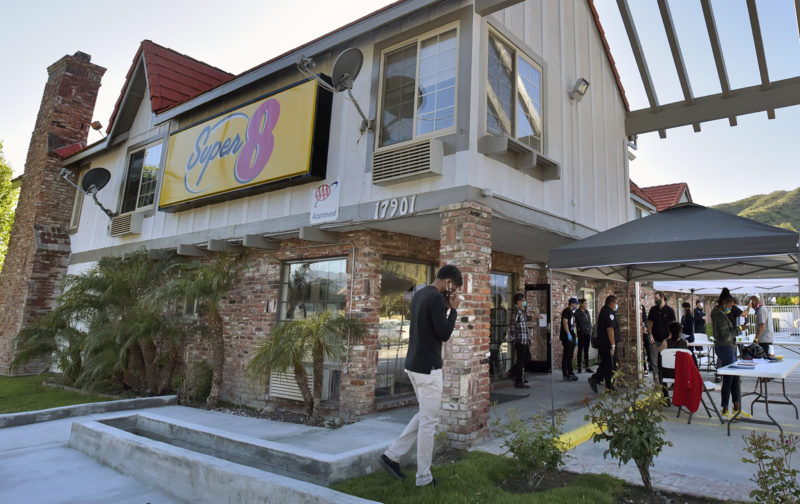Los Angeles County supervisors are expected to review a list of motels they might buy to house the homeless as Project Roomkey begins to close down.
County officials also confirmed Thursday the Super 8 in Santa Clarita, which has housed part of the local homeless population since April, is not on the list for permanent homeless housing.
The shopping for new facilities was prompted by a $54 million award by Project Homekey, the statewide effort to acquire hotel properties to house homeless individuals. The money was given to acquire five motels to provide 430 units to those in need.
Project Roomkey kicked off efforts across the county in April, which included the repurposing of the Super 8 motel in Canyon Country. The site has provided four dozen beds for homeless individuals. The funding, which has been renewed on a month-to-month basis since July 15, is expected to run out in the coming months, ultimately closing down the site Jan. 5, according to Mike Foley, director of Bridge to Home, the Santa Clarita Valley’s primary homeless-service provider.
Foley said Thursday that Bridge to Home supported the idea of the county buying the motel to continue providing housing for the homeless, but the site did not make the cut, according to Michelle Vega, spokeswoman for county Supervisor Kathryn Barger.
“The county is providing the list of the motels for purchase on a motion that will be submitted to the board later this week,” she said via email, adding that, while the list cannot yet be publicly released, “we can let you know that Santa Clarita is not on the purchase list.”
When the Super 8 closes to homeless individuals, the hope is to guide them to local service providers like Bridge to Home so that they can connect them to housing options.
“We’re approaching the lease termination date — sort of the final phase of the project — and to help make sure all participants have support and resources with rehousing, we released an RFI (request for information), which is soliciting information for providers to then receive funding and contracts from us for the rehousing,” said Jeff Proctor, associate director of performance management with LAHSA.
Ahead of the motel’s lease expiration, the L.A. Homeless Services Authority and Bridge to Home are working on a potential $760,000 contract that could assist in housing 30 people who checked in at the Super 8, according to Proctor.
Officials did not respond to requests on the status of the proposed contract.
The board’s review of the motels for purchase will come as Project Roomkey begins to shut down after serving 6,600 people across its 37 sites. Data from LAHSA on the project showed that just more than a third checked out permanently and of that total, 10% found permanent housing, 38% found temporary housing and 20% returned to the streets.
In looking at why there aren’t as many permanent housing placements, LAHSA Communications Director Ahmad Champan said it comes down to funding.
“The Recovery Plan is the housing program for (Project Roomkey) and it hasn’t been funded until recently,” he said. “As time moves forward, and we’re able to use the Recovery Plan money to house Roomkey participants, that number will increase substantially.”
The Recovery Plan will receive $43 million in coronavirus relief funds from the county. LAHSA also expects to receive $80 million in county emergency grants and $15 million in Measure H dollars, but more will be needed to meet the initial Project Roomkey goal to put 15,000 COVID-vulnerable, homeless people into housing, according to a recent LAHSA news release.
The goal is to use the available county funds to house 4,900 COVID-19 vulnerable people at 37 emergency shelters over the next six months at a rate of 400 to 1,000 people per month, according to LAHSA, the lead agency handling Project Roomkey for the county.
“With Project Roomkey, we saw what is possible when our system focuses on a rehousing solution and is provided with the resources and political will to accomplish a goal,” said LAHSA Executive Director Heidi Marston in a statement. “But that was a temporary solution. With the COVID-19 Recovery Plan, we have dedicated, concentrated resources to move our most vulnerable homeless neighbors into long-term supportive housing.”
The Recovery Plan “massive lease-up effort” will be supported by Project Homekey. LAHSA and its network of providers are also calling on landlords to participate in the program by contacting PATH Lease-Up at 323-644-2200, officials said in the news release.








